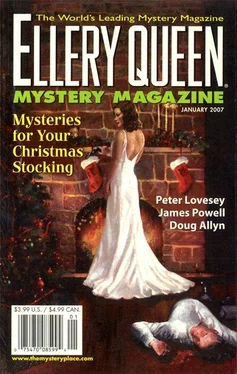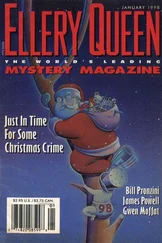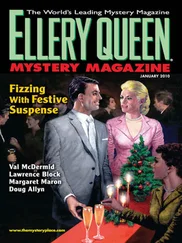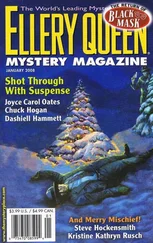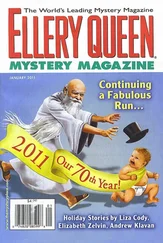Doug Allyn - Ellery Queen's Mystery Magazine. Vol. 129, No. 1. Whole No. 785, January 2007
Здесь есть возможность читать онлайн «Doug Allyn - Ellery Queen's Mystery Magazine. Vol. 129, No. 1. Whole No. 785, January 2007» весь текст электронной книги совершенно бесплатно (целиком полную версию без сокращений). В некоторых случаях можно слушать аудио, скачать через торрент в формате fb2 и присутствует краткое содержание. Город: New York, Год выпуска: 2007, ISBN: 2007, Издательство: Dell Magazines, Жанр: Детектив, на английском языке. Описание произведения, (предисловие) а так же отзывы посетителей доступны на портале библиотеки ЛибКат.
- Название:Ellery Queen's Mystery Magazine. Vol. 129, No. 1. Whole No. 785, January 2007
- Автор:
- Издательство:Dell Magazines
- Жанр:
- Год:2007
- Город:New York
- ISBN:ISSN 0013-6328
- Рейтинг книги:5 / 5. Голосов: 1
-
Избранное:Добавить в избранное
- Отзывы:
-
Ваша оценка:
- 100
- 1
- 2
- 3
- 4
- 5
Ellery Queen's Mystery Magazine. Vol. 129, No. 1. Whole No. 785, January 2007: краткое содержание, описание и аннотация
Предлагаем к чтению аннотацию, описание, краткое содержание или предисловие (зависит от того, что написал сам автор книги «Ellery Queen's Mystery Magazine. Vol. 129, No. 1. Whole No. 785, January 2007»). Если вы не нашли необходимую информацию о книге — напишите в комментариях, мы постараемся отыскать её.
Ellery Queen's Mystery Magazine. Vol. 129, No. 1. Whole No. 785, January 2007 — читать онлайн бесплатно полную книгу (весь текст) целиком
Ниже представлен текст книги, разбитый по страницам. Система сохранения места последней прочитанной страницы, позволяет с удобством читать онлайн бесплатно книгу «Ellery Queen's Mystery Magazine. Vol. 129, No. 1. Whole No. 785, January 2007», без необходимости каждый раз заново искать на чём Вы остановились. Поставьте закладку, и сможете в любой момент перейти на страницу, на которой закончили чтение.
Интервал:
Закладка:
“That’ll be the day. Do we know anybody at Golden State Bank and Trust?” I described my visit with Bender and my interest in Nielsen’s will.
“Seems to me I played canasta with a guy from that bank once,” Paddy said. “You want the details of the trust, I take it. Call me back in an hour.”
It was lunchtime by then, for the dawn patrol at least. I visited a little eatery near the courthouse that had a lot of associations for me, good and bad. I spent awhile wandering down memory lane. Then I called my wife to see how the latest screenplay was going. Then I called Paddy.
“I may have let you down,” he said. “My old canasta partner wasn’t as forthcoming as I’d hoped he’d be. According to him, Nielsen’s trust was dissolved in nineteen fifty-five. It’d been set up for the benefit of a single male child. Once the kid turned twenty-five, the thing just folded.”
“Whose child?”
“My friend wouldn’t say, wouldn’t even give me the kid’s name. That makes me think it had to be Nielsen’s. I never heard she had one, but she might have gone out of her way to keep it quiet. That would fit with all this trust secrecy.”
I wasn’t as fast on ages as Morrie Bender, but I’d spotted a problem. “If this kid was twenty-five in nineteen fifty-five, he was born in nineteen thirty, after Nielsen got back from her year in New York.”
“So she got knocked up out East in ‘twenty-nine. Maybe by some stockbroker she’d talked off a ledge when the market crashed. You do funny things when you think the world’s ending.”
“But she made a movie in nineteen thirty, her talkie, Sunshine. Somebody would have noticed if she’d been pregnant.”
My boss wasn’t concerned. “It only took a few weeks to shoot a movie back then, even with microphones bollixing up the works. She must not have been showing yet.”
It occurred to me that I should have spent my lunch hour down at the Times, boning up on little things like the actual date of Nielsen’s death. Paddy’s thoughts were tending a different way.
“I wonder if Morrie Bender knew that she’d taken up with someone back East. Could have given him a little more reason to have shut her up in that garage. Assuming he was the jealous type. You’ll have to ask Miss Koenig about that.”
“Rita Koenig? How am I supposed to find her?”
“Did I forget to mention that? She was the mystery kid’s guardian. My banker friend let that slip. She drew a monthly check from the trust right through nineteen fifty-five. The address where those checks were sent is up in Vesta. Got a pencil?”
7.
Vesta was a sunny little spot on the coast about halfway to Santa Barbara. It was so sunny on this particular afternoon that the dark glasses I’d used to fight the Pacific’s glare on the drive north were still in place when I knocked at the door of the seaside cottage where Rita Koenig’s trust fund checks had landed. The shades might have accounted for the reception I got from the lady of the house, which was cool. The woman, who was wearing a bathing suit under an unbuttoned housedress, might have taken me for a cop or even an IRS agent. She told me that Rita Koenig didn’t live there anymore. Hadn’t for years. And who the hell cared where she was now?
I still did. I went in search of a phone book, as I had in L.A., and found Koenig right off. The listing had her on a street called Chester, which turned out to be more than a few blocks from the ocean. And on the wrong side of the tracks, if Vesta had been big enough to have tracks. The actual address belonged to a boardinghouse, an old brick one. Koenig wasn’t home, but her landlady was, a Marjorie Main look-alike who was weeding an overrun flower bed. She was more than happy to tell me where Koenig worked. I’d remembered to reveal my steely-blue eyes this time and even to bat their lashes occasionally.
Koenig’s place of business was a diner that made the hole-in-the-wall where I’d had my lunch look like the Brown Derby. Koenig turned out to be the first person I came to when I entered, a little fiftyish woman perched on a stool behind the diner’s cash register. Bender had called Koenig a wildcat, but somehow she’d changed into a wild bird over the years. She reminded me of a sparrow, though the coloring of her dyed hair and penciled brows was much darker. She had sharp features and quick eyes, the eyes made extra prominent by her glasses. I thought for a second that she might be in charge, but when I asked for five minutes of her time, she glanced at a big guy who was scraping down the grill.
“I get a break in ten minutes,” she said. “There’s a bench out front.” She pushed a pack of Old Golds my way and held out a hand, palm up.
“I don’t use them,” I said.
“I do,” she said back.
I paid her, found the bench, and started in to field-strip and clean my pipe. I was twisting the stem back into place when Koenig came out. The first thing she did was to hold her face up to the sun for a few seconds. From the look of her skin, the action was more a ritual than an impulse.
She’d specified the bench, but she didn’t use it. “All I do is sit,” she said and held out her hand for the Old Golds.
I towered over her when I stood to light her cigarette, so I sat down again so I could look into those magnified eyes.
At first she only smoked, going at it so hard it got me longing for a Lucky Strike. Then she asked, “What’s this about Nola Nielsen?”
I’d mentioned the actress back at the cash register. The name had gotten Koenig’s full attention then. Now she was acting as if it barely rang a bell.
“I’m trying to trace her next of kin,” I said, “regarding some property of hers in Los Angeles.” A four-by-four chunk of property, suitable for driveway repair.
“What makes you think I even knew her?”
I decided to jump us ahead a few moves. “She trusted you to raise her son. And you drew a monthly check from her estate for twenty-five years.”
“Never trust a banker,” Koenig said. It was a sentiment popular with people old enough to remember 1929. The cashier went further. “Never trust anybody. That’s what I always told Nola. Nobody in Hollywood was what he seemed. But she trusted everybody, even me.”
“When did that start?”
“Way before Hollywood. She and I grew up together back in Georgia. Even then I was just tagging along. Her people had money. Mine didn’t.”
“Is that where the trust fund came from?”
“Some of it. From a rich aunt. But a lot of it was Nola’s own dough. She was making a thousand a week once she hit it big in pictures. That was serious money back then.”
It still was, for people like Koenig and me. I said, “Then The Jazz Singer came out and the world changed. What happened next?”
“Nola ran off to New York to learn how to talk without a Southern accent. Took her the better part of a year.”
Koenig had worked the same trick, but then she’d had thirty years in little Vesta. She was on her second Old Gold by then, lighting it from the first.
“She came back pregnant. Some Broadway director, she said. Might have been some Broadway cabdriver. She wasn’t far along. She had time to make one last picture.”
“Sunshine,” I said.
It was more information than a flunky trying to trace a next of kin should have had, but I didn’t expect Koenig to call me on it. I’d already asked her questions I shouldn’t have asked and revealed more interest in her past than I should have had. She seemed more than willing to chat, at least about the dead and buried.
“After the movie, we went upstate and hid out until Nola had the kid. That was the start of the bad times.”
Читать дальшеИнтервал:
Закладка:
Похожие книги на «Ellery Queen's Mystery Magazine. Vol. 129, No. 1. Whole No. 785, January 2007»
Представляем Вашему вниманию похожие книги на «Ellery Queen's Mystery Magazine. Vol. 129, No. 1. Whole No. 785, January 2007» списком для выбора. Мы отобрали схожую по названию и смыслу литературу в надежде предоставить читателям больше вариантов отыскать новые, интересные, ещё непрочитанные произведения.
Обсуждение, отзывы о книге «Ellery Queen's Mystery Magazine. Vol. 129, No. 1. Whole No. 785, January 2007» и просто собственные мнения читателей. Оставьте ваши комментарии, напишите, что Вы думаете о произведении, его смысле или главных героях. Укажите что конкретно понравилось, а что нет, и почему Вы так считаете.
